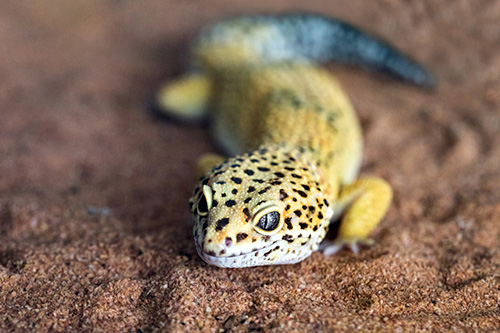Exotic Pet Medicine and Surgery
Home » All Services » Exotic Pet Medicine and Surgery
Our veterinarians are experienced in providing specialized care and treatment for exotic companion animals, including ferrets, gerbils, guinea pigs, hamsters, iguanas, rabbits, and snakes. We understand their unique health needs and can provide diagnostic, therapeutic, and surgical services, as well as counseling on nutrition, behavior, and general care.

Just because they’re small doesn’t mean they can’t benefit from veterinary attention
- Teeth, which grow continuously in gerbils, guinea pigs, and hamsters, often require trimming
- We can recommend appropriate chew toys, which may help keep the teeth worn down
- Parasites such as lice, mites, and fleas can infest your pet and they can suffer from other health issues
- Call us if your pet stops eating, loses weight, appears quieter than normal, has discharge from the eyes or nose, or develops a lump on its body
- We can provide treatment that fits within your budget

- We can recommend proper diet, housing, grooming, and even litterbox training
- We also strongly suggest that you have your rabbit spayed or neutered
- Rabbits can potentially give birth once a month and they can also have up to 14 babies at a time
- Spaying or neutering can protect your rabbit from several types of cancer and reduce or eliminate aggression
- Spaying or neutering can reduce or eliminate other undesirable behaviors such as spraying, mounting, destructive chewing, and biting
- With regular dental checkups, we can make sure problems with your rabbit’s teeth don’t turn into serious, potentially life-threatening conditions
- Rabbits are susceptible to a variety of diseases and conditions, including overgrown teeth, hairballs, parasites, and cancer and they tend to hide signs of illness or pain
- Contact us if your rabbit:
- Has discharge from the eyes or nose, runny stool, or a gurgling stomach
- Has an elevated or low temperature
- Begins drooling, scratching at the ears, or sneezing
- Starts tilting his or her head
- Develops bald patches in his or her fur
- Stops eating, appears quieter than normal, or shows other abnormal behavior

- We can provide you with information on appropriate enclosures, environmental requirements, sanitation, and disease prevention
- Nutrition-related disorders and diseases are common in iguanas and other lizards so call us to set up a nutritional consultation
- We also offer an initial checkup for new lizard owners to help identify current or potential medical problems and, if necessary, begin treatment
- Yearly checkups allow us to detect any changes that occur and help prevent or catch diseases early, when they’re easier to treat
- Regular blood tests can help determine whether your ferret has any problems with the kidneys, liver, or pancreas
- Ferrets can also benefit from receiving certain vaccinations and monthly preventives, which we can discuss with you during your visit
- Please bring a stool sample to your ferret’s annual exam so we can test for internal parasites
- As ferrets age, they may need additional testing and dental care
- Common problems associated with ferrets include gastrointestinal disease, parasites, and cancer and being inquisitive, they frequently ingest objects they shouldn’t
- Unless you are planning to breed your ferret, we recommend that he or she be spayed or neutered
- Female ferrets, or jills, do not need to give birth once to stay healthy and spaying can save a ferret’s life
- Jills that haven’t been spayed will stay in heat until they’re bred which can cause a fatal anemia (a decrease in red blood cells)
- In male ferrets, neutering can reduce their strong body odor, prevent marking, and reduce aggressive behavior
- Please contact us right away if your ferret develops any unusual symptoms, such as:
- vomiting
- diarrhea
- hair loss
- lack of appetite
- trouble breathing
- black ear wax
- discharge from the eyes or nose
- lumps or swelling
- an increase in aggression or sexual behavior (especially in neutered males)
- We recommend that you bring your new snake in for an initial exam so we can make sure it’s healthy and determine its sex
- We can share our knowledge of appropriate enclosures, temperature and humidity, lighting, substrates (ground covering), cleaning, and skin shedding
- Besides having feeding requirements that are species specific, snakes can become stressed and may not eat
- Although snakes don’t need vaccinations, they can benefit from routine exams and If your snake needs future veterinary attention, we’ll have a baseline to compare against
- A healthy snake should flick its tongue and be alert and active, showing interest in its environment and its scales should be smooth and dry
- Snakes can suffer from a variety of diseases, some of which can cause serious respiratory, gastrointestinal, and liver problems
- They also commonly harbor internal and external parasites, including hookworms, roundworms, mites, and ticks
- Call us immediately if you notice any of the following signs of illness:
- vomiting or regurgitation
- diarrhea
- loss of appetite or weight
- weakness or loss of energy
- wheezing, mucus or bubbling around the nostrils
- changes around the mouth (inflammation, purplish-red spots, dry and diseased tissue)
- changes in the skin (reddening, slow-healing sores, swelling, discharge)



